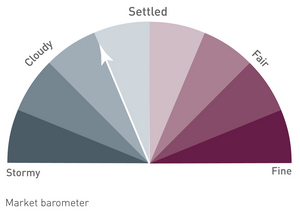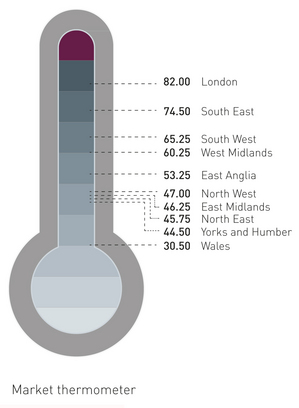The WPJ
THE WORLD PROPERTY JOURNALReal Estate Facts Not Fiction
Residential Real Estate News

UK Enjoys Highest Property Transaction Volumes Since 2008 in Q1
Residential News » Europe Residential News Edition | By Michael Gerrity | May 8, 2012 12:22 PM ET
According to a new Chesterton Humberts Residential Observer report, residential transaction volumes in the UK during Q1 2012 were at their highest levels since Q1 2008. A total of 198,000 transactions were completed which was 14.5% higher than in the first quarter of the previous year.
Chesterton Humberts' CEO Robert Bartlett commented, "The double dip recession may be claiming the headlines but fundamentally on the street it feels that the residential property sector is finally showing signs of a more sustained recovery. Transaction volumes are up, and judging by our pipeline, they look to be strengthening. Crucial to the ongoing recovery is the availability of mortgage funding at reasonable rates.
 "Although the early part of the year looked encouraging in terms of mortgage borrowing, it is now clear that the banks are restricting lending once again. The market is seeing horrendous delays on sales as a result of banks, and particularly HSBC, taking extended time to make mortgage offers available. In the case of HSBC, who now have about a 15% share of the UK mortgage market, this seems partly due to the company's decision to introduce a restricted panel of solicitors to handle conveyancing checks on their behalf which has severely slowed the conversion of sales. It is essential for sensible levels of mortgage funding to be forthcoming and provided this happens, we are confident that the housing market will continue to recover, albeit slowly.
"Although the early part of the year looked encouraging in terms of mortgage borrowing, it is now clear that the banks are restricting lending once again. The market is seeing horrendous delays on sales as a result of banks, and particularly HSBC, taking extended time to make mortgage offers available. In the case of HSBC, who now have about a 15% share of the UK mortgage market, this seems partly due to the company's decision to introduce a restricted panel of solicitors to handle conveyancing checks on their behalf which has severely slowed the conversion of sales. It is essential for sensible levels of mortgage funding to be forthcoming and provided this happens, we are confident that the housing market will continue to recover, albeit slowly."Perhaps the most exciting thing in 2012 so far has been the marked increase in volume of the regional markets and it is encouraging to see activity picking up in the north although a significant revival is not yet visible.
 UK Market Highlights Include:
UK Market Highlights Include:- Despite the economy having dipped back into recession there have been some encouragingly positive indicators. HMRC reported that Q1 saw the highest first quarter transaction volume in the UK since Q1 2008 - a total of 198,000 transactions were recorded which was 14.5% higher than in the first quarter of the previous year.
- Meanwhile, the Nationwide consumer confidence index reached a nine month high in March and average achieved to-asking prices have risen in each of the first three months of the year according to Hometrack. Rightmove additionally report that average asking prices rose by 2.9% in April to reach an all-time high of £243,737, 0.5% higher than the previous record set in May 2008.
- Nonetheless, average monthly house price inflation in England & Wales turned negative in March (-0.6%) compared to the modest 0.1% increase recorded in February according to Land Registry data. Average prices are now 12.2% below their pre-recession peak of November 2007. On an annual measure, average prices also fell by 0.6% for the second month in succession.
- According to data from the British Bankers' Association, the number of loans approved for house purchase in March was a hefty 22.5% higher than in February - although 5.3% lower than in March 2011. Notwithstanding this, many households are still reducing or repaying their borrowing where possible.
- Although Bank Rate remains on hold a number of high street banks have raised their standard variable interest rates in response to the higher cost of raising money from wholesale markets due to the Eurozone crisis - although there is likely also an element of ongoing balance sheet maintenance at play. The gap between Bank Rate and the average mortgage rate is now the highest since records began 17 years ago.
- More positively, HSBC has announced it will increase its LTV for new build properties from 75% to 85% which may persuade other banks to follow suit and provide welcome impetus for this segment of the market.
- The private rented sector has enjoyed a similarly buoyant start to 2012. Survey evidence from ARLA and Paragon point to improved rental returns and modest increases in tenant demand in Q1. Moreover, landlords are generally optimistic about market prospects going forward.
Bartlett concluded, "While some high value property sales to international buyers have fallen through due to the stamp duty measures announced last month, the full effect remains to be seen. The proposed introduction of an annual levy on residential property valued at more than £2m held in a corporate wrapper and the introduction of a capital gains tax on disposal of these properties could trigger a spurt of sales, boosting stock levels which remain very tight.
"Attention will now be focused on the political changes underway on the Continent. Our Government must hold its nerve and ensure the financial credibility of the UK as an ongoing safe haven. Above all Government must resist killing the goose that lays the golden egg. Heaven only knows the UK needs the investment".
Sign Up Free | The WPJ Weekly Newsletter
Relevant real estate news.
Actionable market intelligence.
Right to your inbox every week.
Real Estate Listings Showcase
Related News Stories
Residential Real Estate Headlines
- More Americans Opting for Renting Over Homeownership in 2024
- BLOCKTITLE Global Property Tokenization Platform Announced
- Small Investors Quietly Reshaping the U.S. Housing Market in Late 2024
- Greater Miami Overall Residential Sales Dip 9 Percent in November
- U.S. Home Sales Enjoy Largest Annual Increase in 3 Years Post Presidential Election
- U.S. Housing Industry Reacts to the Federal Reserve's Late 2024 Rate Cut
- U.S. Home Builders Express Optimism for 2025
- Older Americans More Likely to Buy Disaster-Prone Homes
- NAR's 10 Top U.S. Housing Markets for 2025 Revealed
- U.S. Mortgage Delinquencies Continue to Rise in September
- U.S. Mortgage Rates Tick Down in Early December
- Post Trump Election, U.S. Homebuyer Sentiment Hits 3-Year High in November
- Global Listings Aims to Become the Future 'Amazon of Real Estate' Shopping Platform
- Greater Las Vegas Home Sales Jump 15 Percent in November
- Ultra Luxury Home Sales Globally Experience Slowdown in Q3
- World Property Exchange Announces Development Plan
- Hong Kong Housing Market to Reach Equilibrium in Late 2025
- Construction Job Openings in U.S. Down 40 Percent Annually in October
- U.S. Mortgage Applications Increase in Late October
- World Property Markets, World Property Media to Commence Industry Joint-Venture Funding Rounds in 2025
- New Home Sales Hit 2 Year Low in America
- U.S. Pending Home Sales Increase for Third Consecutive Month in October
- Pandemic-led Residential Rent Boom is Now Fizzling in the U.S.
- Emerging Global Real Estate Streamer WPC TV Expands Video Programming Lineup
- 1 in 5 Renters in America Entire Paycheck Used to Pay Monthly Rent in 2024
- U.S. Home Sales Jump 3.4 Percent in October
- Home Buyers Negotiation Power Grows Amid Cooling U.S. Market
- Canadian Home Sales Surge in October, Reaching a Two-Year High
- Greater Orlando Area Home Sales Continue to Slide in October
- U.S. Mortgage Credit Availability Increased in October
- U.S. Mortgage Rates Remain Stubbornly High Post Election, Rate Cuts
- Construction Input Prices Continue to Rise in October
- BETTER MLS: A New Agent and Broker Owned National Listings Platform Announced
- Home Prices Rise in 87 Percent of U.S. Metros in Q3
- Caribbean Islands Enjoying a New Era of Luxury Property Developments
- The World's First 'Global Listings Service' Announced
- Agent Commission Rates Continue to Slip Post NAR Settlement
- Market Share of First Time Home Buyers Hit Historic Low in U.S.
- Greater Palm Beach Area Residential Sales Drop 20 Percent Annually in September
- Mortgage Applications in U.S. Dip in Late October
Reader Poll
Marketplace Links
This website uses cookies to improve user experience. By using our website you consent in accordance with our Cookie Policy. Read More





